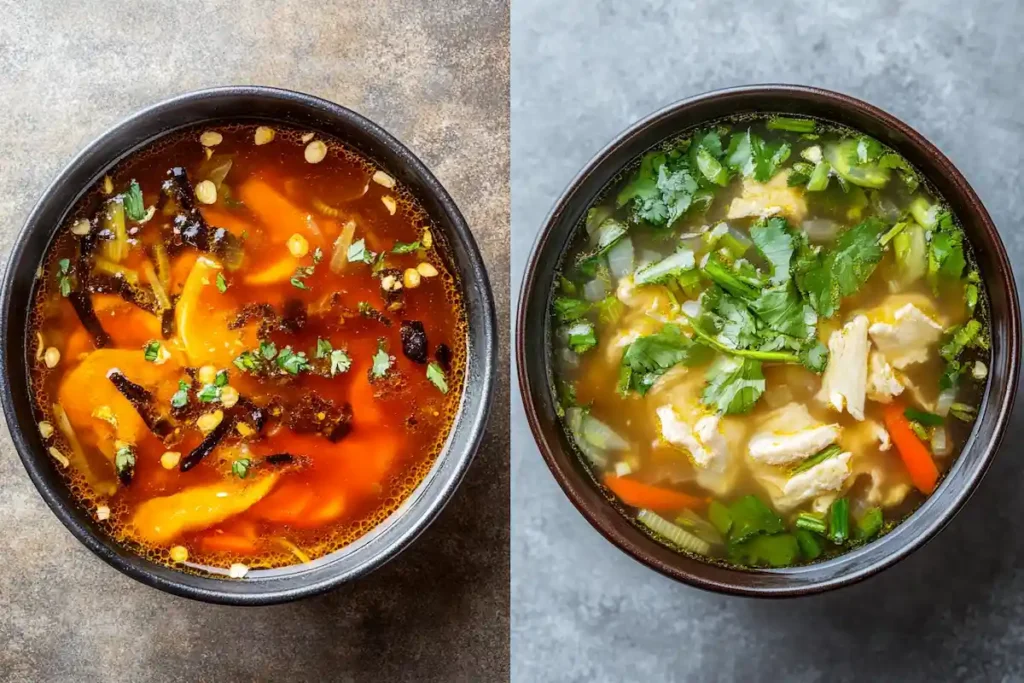Intoduction
Explore if Chinese hot and sour soup is healthy. Learn about its nutritional profile, benefits, and how to enjoy it in a balanced way. A comprehensive guide awaits.
Chinese hot and sour soup is a popular dish known for its complex flavor profile and comforting warmth. However, many people often wonder: is Chinese hot and sour soup healthy? This article will dive deep into the nutritional aspects of this beloved soup. We will assess its potential health benefits, its possible drawbacks, and discuss how to enjoy it as part of a balanced diet. Indeed, it’s very important to be aware of all these aspects.
Indeed, having a solid understanding of the nutritional content of your meals plays a vital role in making informed choices. Also, while Chinese hot and sour soup may offer certain health benefits, it’s important to recognize that its nutritional value will depend greatly on its preparation method and the ingredients used. Furthermore, we’ll examine how modifying recipes can enhance the overall healthfulness of this soup. You can find reliable information about dietary guidelines and nutrition from the Harvard School of Public Health. Learn more about healthy eating guidelines here.
What Is Chinese Hot and Sour Soup?
Chinese hot and sour soup is a flavorful dish with deep roots in Chinese cuisine. It is believed to have originated in the Sichuan province. It’s known for its signature blend of sour, spicy, and savory flavors. However, due to its popularity, numerous regional variations have developed. These include diverse ingredients and preparation styles. Therefore, hot and sour soup, as enjoyed in various parts of the world, can be slightly different.
Origins and Regional Variations
Specifically, the original Sichuan style is notable for its use of peppercorns and chili oil, creating a robust heat. Additionally, other regional adaptations, like those found in Cantonese or Hunan cuisine, tend to have a milder level of spice. They also tend to balance other flavors such as the soy sauce and vinegar. Furthermore, regional variations may also differ in the ingredients used. These slight adjustments can have an impact on the overall flavor.
Characteristic Flavor Profile
Moreover, a characteristic flavor of hot and sour soup is its balanced profile. The sourness comes from the vinegar, the heat from chili, and the savoriness from soy sauce and various seasonings. This combination makes hot and sour soup uniquely appealing and flavorful. However, while delicious, its nutritional makeup is always worth considering.
Common Ingredients
Besides, despite the regional differences, there are many ingredients that commonly appear in the majority of hot and sour soup recipes. These include: bamboo shoots, wood ear mushrooms, tofu, eggs, and various seasonings. These ingredients contribute to the characteristic flavor profile and rich texture of this comforting soup. Consequently, knowing the nutritional value of these base ingredients is an important factor in considering its overall health benefits.
In the upcoming section, we will analyze the complete nutritional profile of hot and sour soup.
Nutritional Profile of Chinese Hot and Sour Soup
The nutritional profile of Chinese hot and sour soup is determined by the individual ingredients that are used in the recipe. It also depends on the way the soup is prepared. Therefore, a full understanding is essential for determining whether this soup is considered healthy. Let’s analyze the key macronutrients, micronutrients, and the overall calorie content of this popular dish. This is a good starting point.
Breakdown of Macronutrients
First, when it comes to macronutrients, hot and sour soup contains a balance of carbohydrates, fats, and proteins. However, the ratios of these can vary based on the specific recipe. Additionally, the carbohydrates are typically sourced from vegetables and thickeners. Furthermore, the fats come primarily from the oils used in cooking and added meats or tofu.
Analysis of Micronutrients
Second, hot and sour soup has a number of important micronutrients. It contains vitamins, minerals, and fiber. Specifically, vegetables like bamboo shoots and mushrooms provide vitamins, minerals, and dietary fiber. Also, soy sauce contains small amounts of iron. Moreover, the added protein sources contribute valuable protein. Therefore, a variety of ingredients helps this soup have some essential nutrients.
Calorie Content
Third, the calorie content of hot and sour soup also varies significantly depending on preparation methods. For example, homemade versions with lots of vegetables and lean proteins are often lower in calories. However, restaurant versions often tend to be higher due to higher fat content. Accordingly, understanding the specific nutritional makeup is crucial when you are trying to determine the health value of hot and sour soup.
Moving to the next part, we will delve into how ingredients contribute to its health.
The Role of Ingredients in Hot and Sour Soup’s Health Impact
The health impact of Chinese hot and sour soup is heavily influenced by the individual ingredients that go into the recipe. Therefore, examining the role of these ingredients in more detail will help you in assessing whether hot and sour soup is good for your health. Specifically, the type of broth, the protein sources, and the vegetables used all greatly affect the health impact of this soup.
Broth Choices
First, the type of broth can greatly impact nutritional value. For example, chicken or pork broth can contain more fat. Also, they can be higher in sodium. On the other hand, vegetable broth provides a lower-fat and lower sodium alternative. Consequently, choosing broth options carefully can make a big difference.
Protein Choices
Second, the protein choice is very important for the overall nutritional balance. Lean proteins, such as tofu, chicken breast, or shrimp, offer valuable protein without excessive saturated fats. However, other protein sources, such as pork, can contribute more fat and calories to the dish. Therefore, it’s very important to be mindful of your protein source.
Vegetable Content
Third, the type of vegetables chosen also matters. Ingredients like wood ear mushrooms, bamboo shoots, and carrots not only add texture, but also offer essential vitamins, minerals, and fiber, all important for optimal health. Thus, increasing the number of vegetables can increase the nutritional content of hot and sour soup.
Seasonings
Additionally, seasonings like vinegar, soy sauce, chili oil, ginger, and garlic, are all important for flavor. They also offer many health benefits. Ginger, for example, has well-documented anti-inflammatory properties. Therefore, the seasonings used also have some positive qualities.
Transitioning to the subsequent portion, we will look at preparation methods and their overall health implications.
Preparation Methods and Their Health Implications

The way hot and sour soup is prepared significantly impacts its overall nutritional and health properties. Therefore, a look into different cooking methods is essential to fully understand its overall health impact. Traditional cooking methods often involve stir-frying with oil, using high-sodium broths, and other steps that could be detrimental to your health. However, making healthier modifications will improve the overall healthfulness of hot and sour soup.
Traditional Cooking Methods
Specifically, traditional cooking often involves stir-frying the ingredients in oil, a step which can significantly increase the fat content of the soup. Also, the use of ready-made broths can add high levels of sodium and some additives. Moreover, some recipes might include deep-fried elements, that can drastically increase the calorie and fat levels. Consequently, these methods can diminish the healthfulness of hot and sour soup.
Healthier Cooking Options
On the other hand, there are several healthier cooking options that can be used for hot and sour soup. For instance, steaming or boiling the ingredients, instead of frying them, will help reduce the amount of fat. Additionally, choosing low-sodium broths and reducing added oils will also help you minimize the fat content, the sodium, and the overall calorie count. Furthermore, you can opt to add your own herbs and spices instead of relying on high-sodium sauces. Therefore, you can greatly improve the nutritional profile by simply changing up how you prepare the dish.
Proceeding to the next chapter, we will examine the potential benefits of hot and sour soup.
Potential Health Benefits of Chinese Hot and Sour Soup

When prepared thoughtfully, Chinese hot and sour soup can actually offer several potential health benefits. Therefore, let’s explore the positive contributions this soup can make as part of a healthy diet. Specifically, we will look at the ingredients that can promote overall well being, and the potential gut health benefits. It is also important to see how soup can fit into a balanced diet.
Vegetable Content
Specifically, a good hot and sour soup recipe is often loaded with a variety of vegetables. These will contribute essential vitamins, minerals, antioxidants, and fiber. Additionally, the fiber found in vegetables is essential for a healthy digestive system. It will also help to promote satiety. Moreover, the variety of different vegetables can supply various nutrients important for many bodily functions. Accordingly, a vegetable-rich hot and sour soup is great.
Spices and their Benefits
Also, the spices used, like ginger and chili, also offer unique health benefits. Ginger is known for its anti-inflammatory properties. Chili may help boost metabolism and support cardiovascular health. Additionally, garlic also contributes to the soup’s overall health benefits by way of its antimicrobial properties. Therefore, these spices can also have a very positive impact on your health.
Lean Protein and a Balanced Diet
Furthermore, using lean protein choices, like tofu, shrimp, or chicken, can also help contribute to a well-rounded meal, that can promote satiety and give you the essential building blocks for healthy cell growth. Indeed, when prepared thoughtfully, hot and sour soup can be a beneficial addition to your meal plan.
Moving forward to the next topic, we will look at any potential drawbacks.
Potential Drawbacks and Considerations
While Chinese hot and sour soup can have several health benefits, there are also some potential drawbacks and considerations that should not be overlooked. Therefore, it’s crucial to be aware of these aspects. This will allow you to enjoy hot and sour soup in a safe and balanced manner. Specifically, we will examine the high sodium and MSG content, and how to avoid allergens. You should also learn the importance of practicing moderation.
Sodium and MSG
Specifically, many commercially prepared hot and sour soup recipes tend to contain high levels of sodium. This is due to using soy sauce and other salty flavor enhancers. Additionally, monosodium glutamate (MSG) is also sometimes used, especially in Chinese takeaway soups. This can also be problematic for people who are sensitive to these additives. Accordingly, it’s important to be aware of the sodium levels.
Allergens
Also, it’s important to note that some common allergens may be present in hot and sour soup, including soy, wheat, eggs, or shellfish. Those with specific food sensitivities should always be aware of the ingredients. Moreover, if you are preparing your own soup, or eating it at a restaurant, double check the ingredients. Therefore, this is key for avoiding any potential allergic reactions.
Moderation
Furthermore, just like all foods, it’s important to consume hot and sour soup in moderation. It should also be a part of a balanced diet. If consumed too frequently, even the healthiest versions can cause issues, particularly related to sodium intake. Consequently, keeping track of your consumption will help you make informed choices for your overall health and wellbeing.
In the next division, we will discuss tips on how to make healthier choices when enjoying hot and sour soup.
Making Healthy Choices When Enjoying Hot and Sour Soup
Making informed choices is essential to enjoy hot and sour soup as part of a healthy diet. Therefore, there are numerous tips you can utilize when ordering hot and sour soup from a restaurant. There are also things to consider if you are cooking a homemade version. Specifically, you should learn how to order healthier options. You should also learn how to modify the recipes to be healthier and more balanced.
Ordering at Restaurants
First, when eating at a restaurant, request lower sodium options, and ask if they have any broth with less oil. Also, you can specifically request for leaner protein options to minimize the fat and calorie content. Moreover, it’s always a good idea to ask about the specific ingredients if you have any particular dietary restrictions. Therefore, these simple steps will help you choose wisely when eating out.
Making Healthier Homemade Versions
Second, when making hot and sour soup at home, you can make it much healthier. For example, use low-sodium broths. Also, choose leaner proteins. Additionally, increase the amount of vegetables. Furthermore, be sure to be careful when you add oil, and use less of it. Therefore, using these tips, you will be able to make your soup much healthier overall.
Balancing Your Meal
Finally, consider how hot and sour soup fits into your overall meal. For instance, balance the soup with other nutritious foods, such as a side of brown rice and steamed vegetables. Also, if you add protein to the soup, ensure that it’s a good lean source to maintain a balanced intake. Thus, combining healthy choices will ensure an overall healthy and satisfying meal.
On to the following discussion, let’s explore some frequently asked questions.
Frequently Asked Questions (FAQs)
Let’s answer some of the most frequently asked questions about Chinese hot and sour soup and its impact on your health. These questions will clear up any confusion about the health aspects of this popular soup.
Is Chinese takeaway hot and sour soup healthy?
Chinese takeaway hot and sour soup can often be less healthy due to higher levels of sodium, fats, and added oils. However, healthier choices can always be made when ordering at restaurants.
Which Chinese soup is healthiest?
Generally, a soup like a clear vegetable broth soup, or a tofu-based soup with lots of vegetables, are often healthier options. They are lower in fat, calories and sodium. However, there are a lot of healthy hot and sour soup options available.
Is hot and sour soup good for you?
Yes, when prepared with nutritious ingredients and with low sodium, hot and sour soup can be good for you, providing essential vitamins, minerals, and fiber. However, it’s important to be aware of the ingredients.
How many calories are in Chinese hot and sour soup?
The calorie count in Chinese hot and sour soup varies widely. It depends on the preparation methods and ingredients used. Typical restaurant versions can range from 200-350 calories per serving, but homemade lightened versions can easily be lower.
Conclusion
In conclusion, is Chinese hot and sour soup healthy? The answer is nuanced and depends on the ingredients and preparation methods. While it can provide several potential health benefits, such as being a source of fiber, vitamins, and anti-inflammatory spices, it’s essential to be mindful of sodium levels, fat content, and overall calorie count. Therefore, making informed choices and practicing moderation is key to enjoying this flavorful soup as part of a healthy and balanced diet.
Indeed, by choosing healthier preparation methods, swapping high-sodium or fatty ingredients for leaner alternatives, and increasing the amount of vegetables, you can significantly improve the nutritional profile of hot and sour soup. Furthermore, balancing this delicious soup with other nutritious food choices will promote overall wellness.
So, go ahead and enjoy Chinese hot and sour soup, but always remember to be aware of the ingredients and preparation methods. You will be able to enjoy a flavorful and comforting soup, while also supporting your health.
For a nutritious and flavorful meal idea, try our Grilled Avocado Bread: A Tasty Guide.

